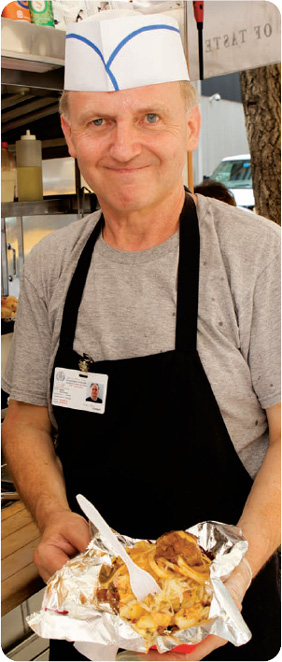
Some of the best hot dogs in New York are really the wurst. More than a century after Charles Feltman first served sausages on buns in Coney Island in 1867, it’s hardly surprising that it would take a fellow German immigrant to cultivate the city’s taste for a superior sausage. At the northwest corner of 5th Avenue and 54th Street, lunchers line up down the block to get their “German Soul Food” fix at Hallo Berlin. Founded by the late Rolf Babiel, the Hallo Berlin cart specializes in a hearty and extensive menu that includes your choice of nine types of wursts, ranging from your standard better-than-a-hot-dog Knockfrank to pork Bratwurst, chicken Alpenwurst, veal Weisswurst, and beef Currywurst. While Germans may lay claim to thousands of varieties of sausages, rest assured that the best of the best are covered here.
Born in Hoyerswerda, East Germany, in 1952— the very year that they closed the inner German border—Rolf was allowed to emmigrate from East Berlin to West Berlin in 1975. When he came to the United States six years later, he brought little with him, but he had big plans. “When he came here it wasn’t about food,” says his wife and business partner, Bernadette. “Rolf had ideas. He had a tremendous amount of ideas.” A former machinist back in East Germany, Rolf found construction work when he first arrived. “He was working on a building doing Sheetrock for $3.50 an hour, and he saved every penny. He did not go out to lavish parties. He was as simple as he could be.”
While German pushcart vendors had been a vibrant part of the Lower East Side during the late nineteenth century, by the early 1980s most Germans had left the pushcart trade to newer immigrant groups like the Greeks and Egyptians, and Rolf saw an opportunity. As Bernadette explains, “There were no European pushcarts at that time in the streets, so he walked around the whole city. Brooklyn, Bronx, Queens, Long Island, he went all over. An associate of ours used to work at the University Club—that was before Fifth Avenue looked the way it looks—he figured okay, that was it. He stood around hours and hours to observe the traffic of the people.” Rolf told Jesse Baker of NPR’s Weekend Edition in 2005, “I had a couple of times these hot dogs, and I said, New York deserves something better.”
The cart itself is compact and efficient—clearly a product of German engineering. Sausages sizzle on little pans alongside German fried potatoes and sautéed onions before getting placed in a crusty roll with cabbage, onions, and a sinus-clearing homemade mustard. As the winner of the inaugural Vendy Awards in 2005, the quality of Hallo Berlin’s food is indisputable, but beyond the sausages and sauerkraut, it was Rolf’s way with people that made him so special to everyone who knew him. “He was always very funny with the customers,” says eldest son, Peter Babiel. “He always gave them a reason to come back. Not just because of his food, but because of his personality. He made friends with everybody.”
“New York would never have another vendor like this character. You have all the new vendors coming along … I see so many vendors copy his ideas … I love to see other people embrace his ideas.”
Charming and engaging with a wicked sense of humor that still permeates every aspect of the cart from the way the sausages were all named after German automobiles (the Bratwurst is the Mercedes, while the chicken Alpenwurst is the East German Trabant) to the popular Joseph Stalin Dictator Special and Winston Churchill Democracy Special. With Stalin, you pay less, but you get no choice. With Churchill, you pay more but you get to choose your own sausages and sides and get a couple extra meatballs thrown in. How do Americans vote? Surprisingly pro-dictator. As Rolf explained to Weekend Edition, “And so strange as it sounds, this is the hit in New York. They want this special.”
Rolf grew his pushcart business into a Hallo Berlin empire that today includes a full-service restaurant and beer garden on 10th Avenue between 44th and 45th Streets and a tavern upstate in Conklin, New York. But success was not without years of hard work and personal sacrifice. “He did everything. From stocking the cart with food, cleaning it every night, bookkeeping,” says Peter. “You see them out there only for a couple of hours but the job goes from early in the morning to late at night. There’s actually more to it behind the scenes than people realize.” With all the demands on his time and attention, Rolf still found the time to engage with each and every customer even as his line stretched down the block and around the corner. “The cart was the first wife; I was the second wife,” says Bernadette with a smile. She’d tell Rolf, “When you finish with your first wife, you can come home to your second wife.”
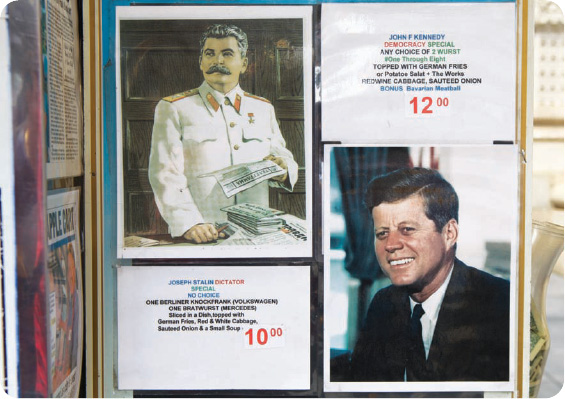
When Mayor Koch was cracking down on street vendors in the late ’80s, Rolf’s vending license and cart were confiscated by the city. Rolf fought back and collected signatures of support. At the time he told David Handelman in a New York magazine interview “I came out of East Germany by fighting that government. I have the guts to fight the city. That cart is my life.” Rolf was unyielding in his efforts. “He went all over the streets,” says Bernadette. “He was there at nighttime. He was there at lunchtime. He would get up early in the morning.… I still have all of the signatures. I still have them. From actors, you name them, government people.… ” Mayor Koch relented and gave Rolf back his permit, but to this day Bernadette has no idea what happened to the original cart. “I don’t think anybody had the soul, the pain that he went through to build this legacy … as long as I have breath, I’m going to try to keep that legacy.”
Though Rolf was the face of Hallo Berlin, he and Bernadette built the business side by side. In the beginning, they worked together at the cart, but while Rolf thrived off street life, he hated to see its effect on his wife. “The people used to come in the cart, and they didn’t know who I was. They thought I was just, whatever, she’s just a worker, you know.” As much as New York is known for being cosmopolitan and progressive, as a biracial couple in the ’80s the Babiels still faced prejudice from both customers and strangers. It was Bernadette who came up with the concept of German soul food, a story she’s never shared until now. “One day we were cooking and I said, You know what honey, I got an idea. You know how we’re going to get people to love us? To accept us for who we are? German man, Haitian woman together? Let’s call it German Soul Food.” Rolf added it to the menu, and it’s been there ever since. According to Bernadette, that will never change. “We get a lot of questions, what is German Soul Food? German Soul Food is black and white. Because whenever you go to the South you hear, soul food, soul food, soul food. Germany never had any soul food. There’s no such thing as soul food in Germany, so we figure, us as a couple, as a black woman and a European man, we make soul food. German Soul Food.” The concept resonated with customers immediately. Sales skyrocketed. To this day the German Soul Food combos are still among the most popular orders with regulars and newbies alike.
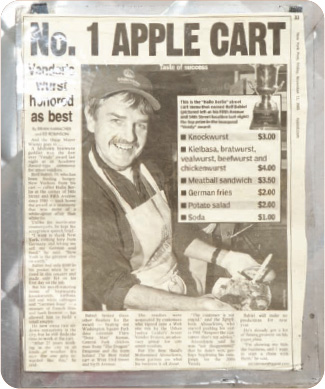
These days the Hallo Berlin tradition is carried at the cart by Rolf’s younger brother, Wolfgang Babiel. The brothers operated the cart together from 2004 until Rolf’s passing in 2009 and Wolf-gang’s devotion is palpable. He works long hours to maintain the cart to Rolf’s high standard of excellence. “This was made with his heart,” Wolfgang says. “Not only for making money. This came from his inside. I’m here and as long as I can do this, I do it in his name.” After Rolf’s passing, the cart was sidelined for over a year while the family dealt with paperwork and permitting issues. These days, fans are overjoyed to have their favorite lunch-on-wheels back in its regular spot, though Bernadette admits there’s the occasional complaint from customers missing Rolf’s larger than life presence. “Look, if I could, I’d be the first one to bring my husband back. I’d be the first one in that line, boy, I’d give my life for it. I would sell everything just to get him back, but at least you’ve got part of him in the street. You see—that’s it. That was him. Without the cart, there wouldn’t be this,” she says, gesturing to the bustling beer garden around her. “Without the cart, there wouldn’t be anything.” As for the future, that will one day be in the hands of their sons Peter and Alex. “My husband and I, we always say, you can build a dream and what your children do with the dream, it’s up to them, you know. It’s not easy to build up dreams today. So this is not a dream. This is a legacy.”
(GERMAN MEATBALLS WITH LEMON CAPER SAUCE)
Adapted from Rolf Babiel’s recipe
In addition to the Hallo Berlin cart, Rolf Babiel’s legacy lives on at what he referred to as “New York’s Wurst Restaurants” Hallo Berlin Beer Garden on 10th avenue and 44th street in Manhattan and Hallo Berlin North Tavern just off of I-81 in Conklin, New York. At the restaurants you can enjoy a stein (or two) of German beer along with an extensive menu of German delicacies that aren’t practical to prepare in the confines of the cart. The Königsberger Klopse, an epic boiled meatball platter with lemon caper sauce served over Garlic Mashed Potatoes (page 68) is especially popular.
5 ounces stale baguette or other crusty bread
 pound ground beef
pound ground beef
 pound ground pork
pound ground pork
2 egg yolks
2 cloves garlic, mashed
¼ teaspoon marjoram
¼ teaspoon caraway seeds
¼ teaspoon salt, plus more for salting
¼ teaspoon ground white pepper
4 egg whites
½ cup lemon juice (about 2 lemons)
1 teaspoon lemon zest
½ teaspoon all-purpose flour
4 tablespoons drained capers
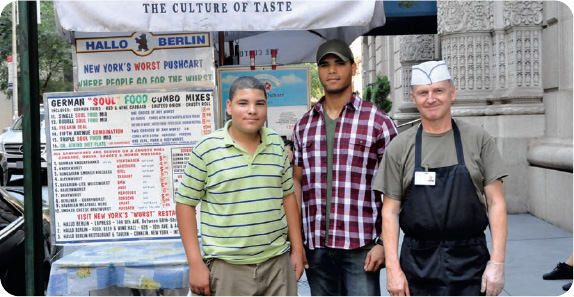
Break baguette in half and place it in a large bowl. Cover with water then use a plate to weigh down the bread. Soak about 5 minutes or until fully saturated.
In a large bowl, mix together beef, pork, egg yolks, garlic, marjoram, caraway, salt, and pepper. Squeeze out as much water as possible from the bread. Break bread into pieces and work into meat mixture. Roll meatballs into golf ball–sized balls.
Bring 1½ quarts of salted water to boil in a large and deep sauté pan. Turn the heat down to low and add the meatballs. Cover and simmer for 20 minutes.
Move oven rack to center position and pre-heat the oven to 225°F. Using a slotted spoon, remove meatballs from simmering liquid and transfer to an oven-safe baking dish then keep in warm oven while you prepare the lemon caper sauce.
In a medium bowl whisk together egg whites, lemon juice, zest, and flour until flour is thoroughly incorporated. Transfer mixture to a small saucepan and heat over very low heat, whisking constantly until mixture thickens to a silky white gravy, about 5 minutes. Remove from heat, stir in capers then transfer to a gravy boat or bowl for serving.
Portion meatballs on top of Garlic Mashed Potatoes (page 68) and top with lemon caper sauce. Serve immediately.
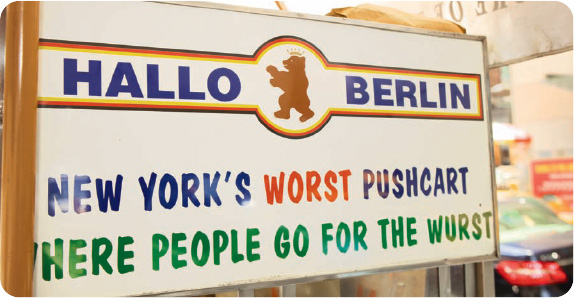
Adapted from Rolf Babiel’s recipe
Warm and comforting, these garlicky mashed potatoes are a popular side dish at Hallo Berlin Tavern in Conkin, New York, as well as their Hell’s Kitchen beer garden. Pair these with Rolf Babiel’s Königsberger Klopse (page 66) or serve them with your favorite roasted chicken or meat loaf.
8 medium red potatoes, peeled and quartered
1 teaspoon salt
2 cloves garlic, peeled and mashed
4 tablespoons salted butter
Add potatoes and 2 quarts of water to a stockpot, season with salt and boil until potatoes are fork-tender, about 10 minutes. When potatoes are close to done, add garlic and butter to a small saucepan. Heat over medium-high until butter is melted and the garlic is fragrant, about 2 to 3 minutes. Remove from heat and set aside. Drain potatoes and transfer to a large bowl. Pour butter mixture over potatoes and mash potatoes. Serve with Königsberger Klopse (page 66).
